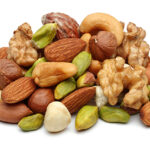Food for Thought
No one ‘diet’ has a monopoly on good health
Just as there’s no one superfood, there’s no one super diet that’s going to be right for everybody. The recent Israeli head-to-header published in the New England Journal of Medicine adds to the growing evidence that the optimal diet for weight loss, for example, can be either low fat, Mediterranean-style or low carb (providing you aren’t pregnant or have kidney disease). When it comes to eating for your long-term health and wellbeing, our view is that your dietary approach is strictly up to you and again can be low fat, Mediterranean-style or lower carb (with the above provisos). Just make sure it’s a balanced healthy one that doesn’t cut out entire food groups and does include a wide variety of foods. It also needs to be enjoyable so you actually want to stick to it. That’s because out here in the real world most of us don’t have the sort of backup they get in weight-loss trials like the Israeli one (eighteen 90-minute small-group workshop sessions over two years plus six 15-minute motivational phone calls when the compliance going gets tough).
Keep in mind:
- Not all carbs, fats or proteins are created equal. It’s the slow low GI carbs, good mono- and poly-unsaturated fats and lean protein you need.
- To achieve substantial weight loss, diet alone won’t do it. Despite the backup, the average weight loss in the Israeli study was a very modest 10–14 pounds (4-6 kg) over 2 years. So you’ve got to pick up the pace and get moving for 3o minutes every day.
- Tightening your belt a notch is not enough. Check out the ‘extras’ – the value-added benefits that will reduce your risk of diabetes and heart attack, help control blood glucose levels and improve your overall health and vitality.
A low GI traditional Mediterranean-style diet delivers the ‘extras’
Numerous studies link living longer and lower risks of heart disease, diabetes and cancer to a traditional Mediterranean-style of diet which would also have been low GI thanks to the abundance of legumes and less processed grains. Although dietary habits vary around the Mediterranean, there are some key ones found in most places. Dr Antigone Kouris, who has carried out extensive research on the Mediterranean diet and longevity, picks out 7 healthy eating habits from a traditional Greek diet for long-term health and wellbeing.
![[GREECE]](https://glycemicindex.com/blog/2008/sept08/greece200.jpg)
‘The Greek version of the traditional Mediterranean diet is low in saturated fat (due to low intake of animal foods), high in monounsaturated fat (mainly from olive oil, olives, nuts) and omega-3 fats (fatty fish, wild greens, nuts), high in plant protein (from grains, nuts and legumes), moderate in animal protein, moderate in carbohydrate, and high in fibre (from legumes, nuts, vegetables and fruits). Traditional meals included large quantities of salads or cooked vegetables (especially dark green, leafy artichokes) rich in olive oil (which helps absorb the fat soluble antioxidants) and legumes – these were eaten frequently as a meal in place of meat (this is also good for the environment!). Traditional Greeks consumed wholegrain sourdough bread daily, usually with a meal (rather than as a meal) but unlike their Italian counterparts, rice and pasta were consumed less frequently. Wine was consumed in moderation and almost always during meals. In addition, many traditional Greek foods are high in magnesium (dark green leafy vegetables, nuts, Greek coffee) which can help improve insulin function and also add cinnamon (cassia) to many sweets which may help lower blood glucose levels.’
7 healthy eating habits from the traditional Greek diet
- Eat legumes as a meal at least once a week – The beans have it – they are easy on the budget, nutritious, filling, low in kilojoules and low GI. They have been associated with long-lived food cultures such as the Japanese (soy, tofu, natto, miso), the Swedes (brown beans, peas) and the Mediterranean people (lentils, chickpeas, white beans). Harvard researchers who persuaded 26,000 Greek people to record their food intake for eight years found that eating less red meat and more peas, beans and lentils cut the risk of cancer by 12%. British Journal of Cancer
- Eat lots of dark green leafy vegetables like spinach, rocket, endive, chicory, amaranth and mustard greens (found in Australian supermarkets as choy sum, buk choy, Chinese spinach) which are also excellent sources of magnesium and plant omega-3 fats). These can be steamed/boiled and served with olive oil and lemon juice or throw them into salads, soups, stir fries or casseroles. And while you are cooking, be generous with herbs like oregano, rosemary, dill and mint – they make vegetables taste great so you eat more of them. Don’t serve them up plain, either. A little dressing goes a long way – Greeks like to add oil/lemon/vinegar to vegetables (and starchy foods) which not only boosts the flavour, but it helps to lower the overall GI of the meal.
- Eat a range of brightly coloured vegetables including tomatoes and capsicum – they’re high in antioxidants, including lycopene. Add them to slow cooked stews with meat along with garlic, onion and olive oil – this style of cooking produces less carcinogens than grilling and barbecuing.
- Use extra virgin olive oil – the recent University of Navarra study published in the British Medical Journal reported that sticking closely to a Mediterranean-style diet may protect against the development of type 2 diabetes and identified extra virgin olive oil as a key constituent for diabetes protection noting that studies have reported it may protect against insulin resistance and the metabolic syndrome.
- Enjoy some fermented foods like yoghurt, feta cheese and olives that may help provide gut healthy bacteria. In the traditional Greek diet, milk intake was rather low, but consumption of sheep/goat cheese and yoghurt was moderate; goat feta cheese has less fat (around 16%) than most yellow cheeses (more than 25% fat). Top salads and vegetable stews with feta.
- Eat fish and seafood – Rich in omega-3 fats, they were eaten more often than animal meats because until recently meat was expensive whereas fish consumption was a function of proximity to the sea.
- Snack on nuts and seeds – Traditional snacks in Greece include pumpkin seeds, roasted chickpeas, almonds, walnuts, as well as dried and fresh fruit.
![[ANTIGONE]](https://glycemicindex.com/blog/2008/sept08/antigone120.jpg)
Antigone Kouris
Dr Antigone Kouris is a dietitian and nutrition research fellow from Monash University.
Contact: info@healthyeating.com
For more information on the Mediterranean diet and some delicious traditional Greek recipes: www.healthyeatingclub.org







